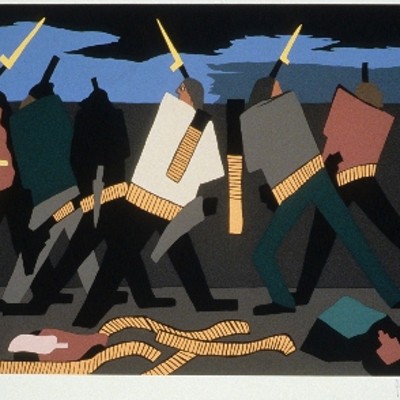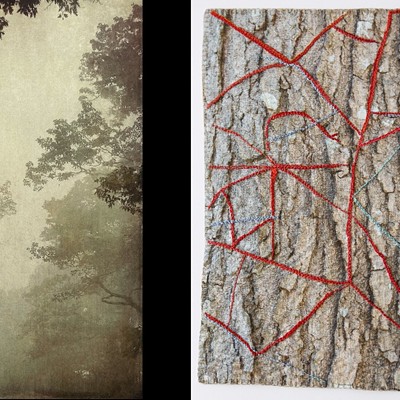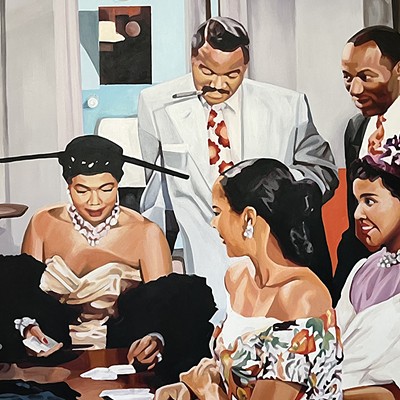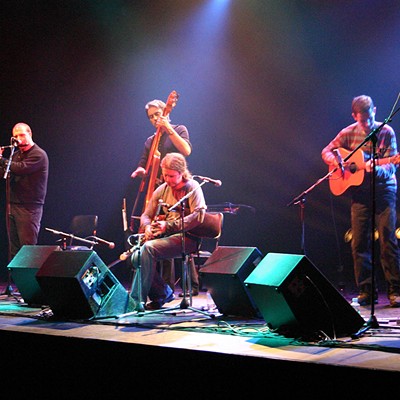SEVEN SINGERS ARE cavorting around Arizona Opera's makeshift rehearsal space on North Mountain Avenue, taking care not to trip over the chairs and tables evoking an 18th-century noble's house.
A week before show time, the septet of singers is deep into a rehearsal of Mozart's Le Nozze de Figaro (The Marriage of Figaro), and they have to master more than gorgeous music. Ordered hither and yon by stage director Michael Cavanaugh, they must make their way through the comic physical maneuvers demanded by this tale of sexual scandal and mistaken identity.
Dean Elzinga, as the irrepressible manservant Figaro, expertly dodges his angry master, the philandering Count Almaviva (Brett Polegato), by leaping and lunging across the room. Antonio, played by Tucson's own Charles Roe, a UA prof, hops up onto a chair, waves a bouquet of red posies and sings lustily. Bartolo (Donald Hartmann) shakes a stick at the proceedings, followed by Basilio (Reynaldo Romo, another Tucsonan) waving a white cloth. At the end of the scene, Figaro, his bride-to-be Susanna (Diane Alexander) and the Countess (Kelley Nassief) chase away a trio of adversaries, at least one of whom is demanding to marry Figaro herself.
"This is difficult to stage," Cavanaugh cheerfully agrees during a lunch break. The artistic director of Edmonton Opera, Cavanaugh staged Arizona Opera's Lucia di Lammermoor last year but this is his first shot at Le Nozze, which ranks as the world's most frequently performed opera. "There are a lot of characters.... There's one ensemble after another, interrupted by glorious arias." Fortunately, he adds, though there are 10 principals, the chorus is small, made up of just a dozen singers.
The opera's intricate tale is based on the 1784 Beaumarchais play, in French, about naughty goings-on in an aristocratic household. Written just five years before the French Revolution as a savage satire of class privilege, the play was banned in both France and Vienna. To make the story palatable to Emperor Joseph II, librettist Lorenzo da Ponte toned down Beaumarchais' politics. But the opera, first performed in 1786, retains the sauciness of Figaro, the classically French trickster servant whose cleverness is too much for his master. In da Ponte's hands, however, Figaro's political polemic against inequality is transformed into a lament about women's caprice.
Cavanaugh says the opera can be sketched in either dark or light tones, and he prefers it comic.
"It's the classical definition of comedy," he says, "with the conflict resolved at the end. You can present the dark side of that -- it can be seen as a dangerously dysfunctional household. But I view it as: this crisis comes along, and nothing is fatal. I keep it lighter. The sense of fun shouldn't go too far awry.
"I try to keep things weaving and bobbing, to keep recognizable human beings, to keep some elements of the cartoony characters, to keep the sparkle. It takes a lot of rehearsal and the clock just whips by."
The set, rented from Banff Opera, is a series of three 18th-century style rooms, complete with elaborate wall paintings and a garden. The first room is shallow, with barely enough space for the singers to move around. Each of the following rooms is progressively deeper, with the final garden set reaching far into the back of the stage.
The sets mirror Cavanaugh's conception of Le Nozze di Figaro. "I love it. It's the sweetest onion there is, delightful and tangy, every layer you peel off, there's another layer," Cavanaugh says. "The music is the same. There's the immediate attraction of great tunes, but the more you peel back the more there is to find."
Arizona Opera presents Le Nozze di Figaro at 7:30 p.m. Friday and Saturday, November 12 and 13, and at 2 p.m. Sunday, November 14, at the Tucson Convention Center Music Hall, 260 S. Church Ave. A live orchestra accompanies the opera, sung in Italian with English surtitles. The running time is three hours, plus intermissions. Six singers alternate the parts of Susanna, the Count and the Countess. Tickets range from $19 to $69. For reservations or more information call 321-1000.











